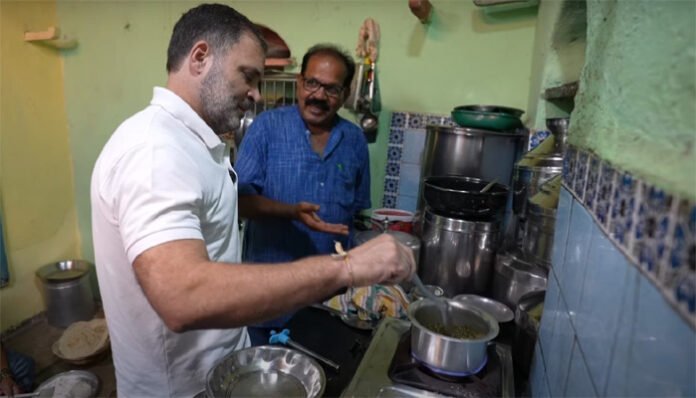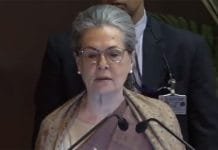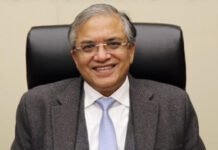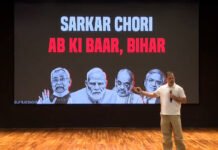
INVC NEWS
New Delhi : The Rahul Gandhi, the leader of the Congress party, recently shared a video showcasing his experience cooking with a Dalit family in Kolhapur, Maharashtra. This heartfelt initiative underscores a commitment to safeguarding the Indian Constitution, which guarantees rights to the Bahujan Samaj.
Cooking Together: A Lesson in Tradition
In the video posted on X, Gandhi is seen preparing traditional dishes alongside Ajay Tukaram Sanade and his wife Anjana Tukaram Sanade, members of the Dalit community. The cooking session served as an opportunity for Gandhi to learn about Dalit cuisine—a culinary tradition that is often overlooked.
Rahul Gandhi Cooks and Dines with a Dalit Family: Watch the whole matter in the viral video
Gandhi expressed that, “Even today, very few people know about the Dalit kitchen. As Shahu Patole ji said, no one knows what Dalits eat.” His curiosity about their food culture motivated him to spend time with the Sanade family, where they prepared dishes such as ‘Harbharyachi Bhaji’ (chickpea greens) and Tuvar Dal with brinjal. Through this engagement, Gandhi aims to bridge the gap in understanding and appreciation of the rich culinary practices of the Dalit community.
Championing Constitutional Rights
During his time with the Sanade family, Gandhi emphasized the importance of the Constitution in ensuring rights and representation for marginalized communities. He stated, “The Constitution gives participation and rights to the Bahujans, and we will protect that Constitution.” This declaration is a reminder of the ongoing struggle for equality and justice in society.
Moreover, he articulated that genuine inclusion and equality can only be achieved when every Indian strives to foster a spirit of brotherhood. “True inclusion and equality in society will be possible only when every Indian tries with a spirit of brotherhood in their hearts,” he remarked. This sentiment reinforces the notion that social change requires collective effort and mutual respect.
Addressing Social Issues
The discussions during the cooking session also highlighted personal experiences related to caste discrimination, shedding light on the challenges faced by the Dalit community. Gandhi and the Sanade family spoke about the lack of awareness surrounding Dalit food culture and the need to destigmatize it. Their conversations aimed to educate the public about the culinary heritage of the Dalit community and its cultural significance.
Promoting Literary Contributions
In addition to cooking, Gandhi’s engagement with the Sanade family underscores the literary efforts to document and celebrate Dalit cuisine. Shahu Patole, who joined Gandhi, has written a book in Marathi focused on Dalit culinary practices. This book is now being translated into English as “Dalit Kitchen of Marathwada”, aiming to highlight the foods consumed by Dalits and promote greater awareness of their cultural contributions.
Conclusion: A Step Towards Unity
Rahul Gandhi’s initiative to cook and share a meal with a Dalit family serves as a meaningful step toward fostering understanding and respect among different communities in India. By engaging directly with the Sanade family, he not only learned about their culinary traditions but also reinforced the necessity of protecting the Constitution that safeguards the rights of all citizens.
This interaction serves as a powerful reminder that social change begins with individuals coming together to learn from one another. Gandhi hopes to inspire others to engage with different communities, fostering an environment of inclusivity and respect for all.
In sharing this experience, he aims to encourage a broader dialogue on the importance of equality, understanding, and celebration of diversity within Indian society.















